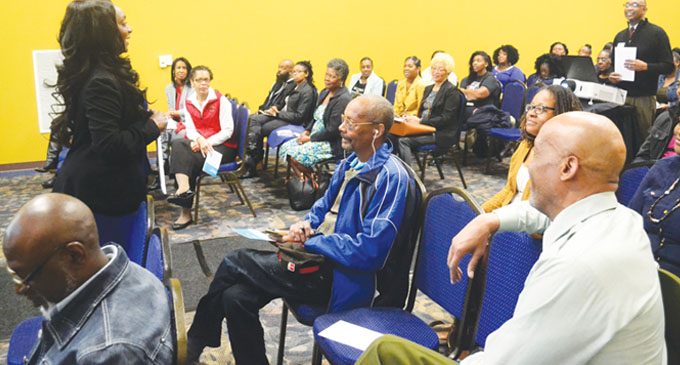Seminar looks at credit and applying for a mortgage

BY TEVIN STINSON
THE CHRONICLE
What’s the difference between good and bad credit? How do I increase my credit score? How does my credit score impact my mortgage payments?
Those were some of the questions raised last Saturday during Part Two of the homeownership seminar hosted by the Winston-Salem Urban League and the Winston-Salem Alumnae Chapter of Delta Sigma Theta Sorority Inc.
As part of the National Homeowners Initiative, the two organizations partnered with the Center for Homeownership to host a three-part series of home-buyer seminars. While Part One focused on connecting potential homebuyers with down payment assistance in the area, Part Two focused on building credit and mortgage payments.
Phyllis Caldwell-George, director of the Center for Homeownership, began the seminar at the Enterprise Center by discussing the Fair Credit Reporting Act , how to obtain a free credit report, the advantages and disadvantages of using credit, and ways to build credit. She mentioned some ways you can build credit is by demonstrating a good payment history, opening and maintain a checking account, and by opening a savings account and making regular deposits.
When it comes to getting a loan to buy your dream home, Caldwell-George mentioned one of the main things lenders look at concerning your credit is your checking and savings accounts.
She also mentioned that banks sometimes use non-traditional credit when seeing if you qualify for a housing loan. Things that fall in the category as non-traditional credit include rent payments, telephone bills, and other monthly expenses.
“Sometimes there are mortgage products that look at a combination of your regular credit and non-traditional credit so you may also demonstrate you have a good credit history by paying your monthly bills on time.”
Following the crash course on credit, Wells Fargo mortgage consultant Boris Elder took center stage. During his presentation, Elder talked about what you should expect when you walk into his office. As he stood before the 50 future homeowners in attendance, Elder said before you even think about reaching out to a bank it is important that you already have a plan.
“You have to show me that you’re serious,” continued Elder. “Create a plan because you have a goal, you want to reach that goal. When you’re sitting across from me in my office, I want to know that you are prepared.”
Another important factor when buying a home is maintaining a workable debt-to-income ratio. Your debt-to-income ratio compares how much you owe each month to how much you earn. According to Elder, a comfortable debt-to-income ratio is 36 percent.
“That includes your new mortgage payment, a car loan, credits cards, loan payments and all those other items that show up on your credit report,” he said. “Whatever the minimum payment is what we count as debt versus your gross monthly income before taxes.”
Even if you earn regular bonuses most banks only use your gross monthly income because extra funds from a bonuses or overtime pay can stop at any time.
To wrap up Part Two of the seminar, licensed real estate broker DaRhonda Morgan gave a brief presentation on S.G. Atkins Community Development Corporation and the affordable homes available in Ridgewood Place, which is in the southeast portion of the city.
While a date has not yet been set for Part Three of the homeownership seminar, according to event coordinators, the seminar will focus on home maintenance.
For more information contact the Winston-Salem Urban League at 336-725-5614.











